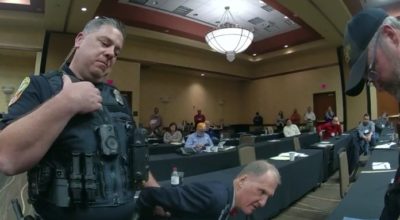

Highway extortion is the story in Adel, Ga., as a city police officer arrests a father of two heading to Tennessee from vacation along U.S. Interstate 75.
By David Tulis / NoogaRadio Network
David Albritton of Cookeville, Tenn., has a second hearing set today (Sept. 28, 2022) in this town seven hours away from home whose woman police officer, E. McClellan, files four criminal charges against him after a pretext traffic stop over his white late-model Camry’s allegedly too-dark tinted windows.
Mr. Albritton says that he has given notice to the city court clerk that he intends to waive the court and have the case heard in superior court of Cook County. A clerk agrees to shift the case out of city court, he indicates. Like a corporation court, superior court is by bench trial only with no jury to try the facts of a case.
The city’s prosecution under the state motor vehicle code at Georgia Title 40 is fraught with error and incompetence. It is violent overreach exercising municipal authority beyond the bounds of the city charter and limited powers of city governments. It is part of a widespread custom among city governments of using fines to supplement tax revenues.
➤ Officers at the jail force Mr. Albritton to strip naked and they search his anus other orifices for drugs, though drugs are not part of the purported criminal case.
➤ Using a government facility at 204 E. 3rd St., they extort F$752.85 from him, including a F$35.85 “service fee,” before he can leave the jail. The law allows for the city to obtain a bond from its victims. Mr. Albritton’s wife, Grace, at 4:01 p.m. paid by credit card the amount demanded by city officials. The receipt is a “Ticket payment receipt.” Initially, the amount appears neither a bond to guarantee his return to court (and would be fully refundable when the case is resolved), nor a payment for a fine, which would have been premised only on a guilty plea. He learns later the money is a bond allowed by law.
On July 8, in the hour of his arrest, Mr. Albritton makes no plea. When time comes for court Aug. 24, he travels seven hours with his dad, David, and makes appearance before the city court judge David Sandbach in a minute long hearing. He pleaded “not guilty.”
“Thumbs up,” he said enroute home. “The judge seemed impartial and professional in the cases. I was the only one in a suit and the only one prepared. They are clearly used to people who are woefully unprepared. I also carried a very serious demeanor about me and I felt a shift in their energy when I communicated with them.”
Study of law steels Albritton for hearing

Mr. Albritton makes a careful personal study of the law before traveling seven hours the day before for the first hearing with his father, David. They spend the night before the hearing at a Day’s Inn.
Adel’s ordinances, online at the LibraryMunicode website, show the corporation adopts provisions in the state motor vehicle code by reference. It adopts some — but not others. That is an important point because the “others” are in chapters of Title 40 the city does not adopt, and so does not claim these provisions of the motor vehicle code, Title 40, as ordinances.
The city appears to be prosecuting criminal charges in a civil court not authorized by the town council vote to prosecute. It’s a criminal matter in a suit making claims for which relief cannot be granted. Arguably, charges under a state motor vehicle law are administrative in nature, and subject to the defense that the officer must be from the proper administrative state agency and subject to the doctrine of the exhaustion of administrative remedies.
Mr. Albritton studied the law and drafted a motion to dismiss and a supporting brief.
Mr. Albritton says Monday the court denies his filing, according to a conversation he had with a clerk. It is unclear how a court with no subject matter jurisdiction can transfer a cause to another court, and how it has any ministerial authority to do anything but dismiss the case.
Arrested for citing 5th
The blue lights flash behind Mr. Albritton as he traveled north with his wife, Grace, and two sons. They are not passengers in the car, but occupants. They have not paid Mr. Albritton to be there, and thus are not passengers. Legally, they are occupants, Mr. Albritton says. This point matters only tangentially, because the enforcement actions are in the domain of transportation and upon commercial users of the highway; Mr. Albritton opts not to raise the defense that he is a private user, not involved in the transportation trade, because he submitted a driver license to the officer, consenting to the presumption he is a commercial user the day of his arrest.
Officer McClellan comes up to the right side rear window and, moving over, speaks to Mr. Albritton from the left hand front window. The exchange involves Mr. Albritton’s demanding to know the nature and cause of the charge and saying that he will not incriminating himself and that he doesn’t want to make any statements. He has a 5th amendment right not to incriminate himself by answering questions, he says.
She orders him out of the car and charges him with obstruction for these questions and then also three other charges, including window tint under federal law and also the child restraint law — two counts — one for each boy.
Here on the merits of the case clearly there is strong support for Any alleged there is strong support to doubt any alleged fact to substantiate these charges.
Mr. Albritton’s task at today’s hearing was to have been to establish the court does not have subject matter jurisdiction in 75 percent of the case, and thus no jurisdiction, since the last 25 percent of the case is the obstruction charge, the existence of which depends entirely on the first three charges.
Subject manager’s diction is obtained by court when its lawful jurisdiction is lawfully invoked by proper claim presented to it by an officer or claimant with lawful authority. Officer McClellan is a city employee and enforces ordinances, a limited authority set by the corporate charter. If the city has adopted a part of the traffic code, it is by explicit reference in the ordinance.
The city of Adel adopted certain provisions in Chapter 6 of Title 40 in Georgia traffic law.
Both window tint statute and the child restraint statute are chapter 8. The city has not adopted any part of chapter 8.
Therefore, the three charges under chapter 8 are not in the authority of a city court judge, and he lacks subject matter jurisdiction to hear the case, he argues in his brief.
Obstruction – charge hangs in air
That leaves the obstruction charge. Obstruction has four elements that must be alleged and proven. But before the elements can be viewed by the court or discussed by the accused, I believe, it would be wise to examine whether there can be at all an obstruction charge if the underlying charges for which the arrest was obstructed are no longer extant, don’t exist.
If the judge can’t hear chapter 8 charges in a chapter 6 jurisdiction, the charges are of no effect. That means that the obstruction charge based on, premised on, supported by these real crimes is void from inception.
But what does Mr. Albritton do if the judge insists on jurisdiction? He makes an objection and continues his pleading. Part of that is interrogation of the officer. The city and the cops have 100 percent of the burden of proof, both as to legal authority and to produce facts to put Mr. Albritton into the area of claim of the statutes at issue.
Reason magazine has two articles about speed trap towns. One is here, and the other is here.


Could it just be “too simple” for People of the Republic states to figure out?
Legal fiction; an assumption that something is true even though it may be untrue, made esp. in judicial reasoning to alter how a legal rule operates; specif., a device by which a legal rule or institution is diverted from its original purpose to accomplish indirectly some other object.
There can be only one reason for the court to be using legal fiction and that would be to subvert the rule of Real Law.
Real Law; a law which relates to specific property, whether movable or immovable. Laws purely real directly and indirectly regulate property and the rights of property, without intermeddling with or changing the state of the person. The lack of statutory authority to make a particular order or a judgment is akin to lack of subject matter jurisdiction and is subject to collateral attack. 46 Am. Jur. 2d, Judgments §25, pp. 388-89.
I know I’ve asked this before, but, why doesn’t the court just order us to register our cars to the state, instead of having car dealers impose fraud for the corporate state upon the People of the Republic state?